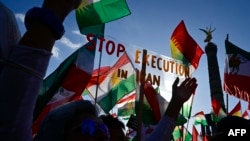Businesses and shops in several cities in Kurdish-populated western Iran shut down Tuesday in a strike protesting the hanging a day earlier of four Kurds convicted of collaborating with Israel, activists said.
The four, who had been arrested in July 2022, were hanged at a prison in the city of Karaj outside Tehran in defiance of a campaign by rights groups who said their trial had been grossly unfair.
Their hanging added to concerns over a surge in executions in Iran, which has seen on average two people executed every day so far this month, according to campaigners.
The Norway-based Kurdish-focused Hengaw group and the France-based Kurdistan Human Rights Network published images they said showed whole streets of shops shuttered in major urban centers, including Kermanshah, Saqez and Sanandaj.
Hengaw said the action was observed in a dozen towns and cities, with internet connections cut and Revolutionary Guard Corps helicopters circling overhead in some areas.
Abdullah Mohtadi, secretary general of the Komala Party which wants greater self-determination for Iran's Kurdish minority but is outlawed by Tehran, wrote on the social media platform X that the general strike had been a "complete success."
The region had been a major center for the nationwide protests that erupted in September 2022 following the death in police custody of the Iranian Kurdish woman Mahsa Amini, who was from Saqez.
Joanna Taimasi, the wife of Mohsen Mazloum, one of the executed men, wrote on X that authorities had refused to hand over the bodies of the four men to their families in western Iran and that they would "instead be buried in an unspecified place."
And Bayan Azimi, whose husband, Pejman Fatehi, was executed, wrote on Instagram she had cut off her son's braid of hair that he had insisted on growing until the day his father was free.
From Tehran's Evin prison, 2023 Nobel Peace Prize laureate Narges Mohammadi said in a message relayed by her family that she and other women "political prisoners" in the jail were again going on a daylong hunger strike to protest the latest executions.
The Iranian judiciary said the four men were convicted of collaborating with Israel on a plan to sabotage an Iranian defense site in the central province of Isfahan.
But Amnesty International said it was horrified by the "arbitrary execution" of the four men, whom it described as "Iranian Kurdish dissidents" sentenced to death "after a grossly unfair secret trial."




